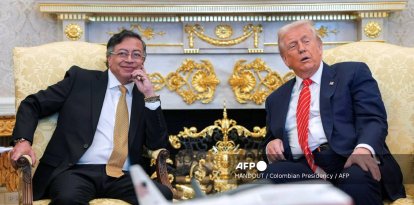Communication specialist Franco Pisso analyzes Javier Milei's campaign: 'He broke with everything expected of a candidate'
A lawyer, teacher and author of two books, Pisso spoke with Voz Media to break down the path of the Argentine president-elect to the Casa Rosada.

Diseño Voz Media
Javier Milei's victory in Argentina was a big surprise for local political calculations. When all the pollsters saw him as lock for third place, the 53-year-old libertarian managed to come out first in the primary elections, enter the second round and then become the most voted presidential candidate in the history of the country. Not bad for someone who landed in politics a little over two years ago. How did this outsider manage to make his way to the Casa Rosada? The answer may lie in his ability to communicate, and, of course, his campaign's ability to reach its audience.
Franco Pisso is an Argentine lawyer, university professor and international master in public speaking from the Esneca Business School. He specializes in communication, has two books on the subject and a YouTube channel where he has millions of views and more than 700,000 subscribers. Based on his own analysis of communication, this paragraph gives him credibility due to the “mental trigger of authority.”
Pisso, from Rosario like Lionel Messi and a renowned fan of Newell's Old Boys, spoke exclusively with Voz Media to analyze the electoral race in Argentina and what ultimately led to Milei being elected president.
Javier Milei 'broke the paradigms that were stipulated'
According to Pisso, Milei made him doubt everything he learned in theory, including whether he really understands communication. Accustomed to traditional Argentine candidates, he suddenly came across a former soccer goalkeeper who arrived at all his events like a rock star and who tried in all his speeches to put the knowledge of a mathematical economist in laymen's terms.
“Right now I am studying it and reviewing all the things that were done. I was critical on many occasions of some of these things, so it seems extremely positive to me to self-criticize and say, 'Obviously they achieved results despite doing what the books said not to do...,'”, he explained.
Indeed, it would usually not be advisable to bring up topics that can attract backlash, but the libertarian managed to do it and emerge practically unscathed.
Milei did not use very technical rhetoric, he was a subject who presented himself as an academic and “broke the paradigms that were stipulated,” according to Pisso. For example, he managed to avoid that “paternalistic communication” that Argentines are accustomed to and exchanged it for a good dose of authenticity, where the key to his election would lie.
How to explain Milei's victory?
The lawyer, author of the book "Snipers," has two possible theories about what happened. “It was very strange. We don't know why. We have to see if this is something that the Argentine population chose because of the context, or because they want to see something else in politics and are tired of loaded speeches," he explained.
However, he believes it is closer to one of the two options. “I believe that the context has a lot to do with it, but it would be something new worldwide if society has grown tired of the political stereotype. That is a bit of the battle that he [Milei] fought from a communication point of view with the concept of 'caste,'" he added.
In Pisso's opinion, what remains to be defined then is the reason for the Argentines. “Because they want an authentic subject or because the other option is much worse, despite the strange things that this authentic subject has,” he continued.
Cracks in the 'political caste'
From the beginning, Javier Milei emphasized the term “political caste” a large part of the traditional politicians, businessmen and local unionists, thus differentiating himself from the rest and enhancing his figure as an outsider.
According to the communication specialist, this strategy paid off. “He drew a line, you belong to the 'establishment' or you don't belong to the 'establishment.' Ideology doesn't matter so much and that message was extremely effective. The people chose the person they saw as authentic, they chose the one who tells them the truth."
Within that sincerity, he recognized the poor state of the Argentine economy, anticipating that the short and medium term would not be very positive for Argentine families. Although this did not work for candidate Italo Luder in 1983, it was effective for Milei.
“He was the only one who said things were very bad. It was not the hopeful and flowery speech to which we are accustomed. People are valuing the truthfulness he is speaking with, and I think that those people who accompanied him are going to be more tolerant. What you are seeing is a man who is completely convinced, convinced of what needs to be done,” explained Pisso.
No to traditional candidates
On the other side was Peronist candidate Sergio Massa, who, although he stands out for his speaking ability and his ability to sweeten any adverse situation for voters' ears, that was not enough to counteract the data from his time as as economic minister, which coincided with triple-digit inflation a poverty rate of 42%.
“Massa's campaign was the best it could have been based on the data Argentina keeps. He did things too well for what was a management that was even disapproved by those who work with him. A candidate with high rhetorical abilities was chosen. It was as if an elite player were going to play for a minor league team. They told him, 'Do what you can,' but it was very difficult to win the game," Pisso analyzed.
The communication challenges for President Milei
Finally, the expert analyzed the potential challenges for Javier Milei as head of state. In that sense, he indicated that he must continue “establishing a direct line of communication with the audience, without a medium that intervenes,” as well as being very cautious when speaking in moments of crisis.
In turn, he stated that the economist must maintain his “authenticity,” even alleging that it is very difficult for him to lie, something that may not be in the politician's manual. As an example, he recalled when he highlighted Margaret Thatcher during the last presidential debate, taking into account that the Falklands (Malvinas) War is very present in the memories of many Argentines.
“Any politician would have said no, but he wants to explain that the Thatcher guy is different from the one who fought the Malvinas [Falklands] War. It's very strange, because what a politician often does most is lie. Communication in a campaign is communication that borders on manipulation, because it involves talking about the appropriate topics and responding to what is appropriate,” he concluded.

























